Destination Search
Filter Results
-
Accessibility
-
Board Basis
-
Accommodation Type
-
Holiday Type
-
Star Rating
-
The UK's largest accessible holiday specialist
-
Guaranteed accessible accommodation
-
Many properties personally audited
-
Flights, adapted transfers & equipment hire
Disabled Holidays in Germany
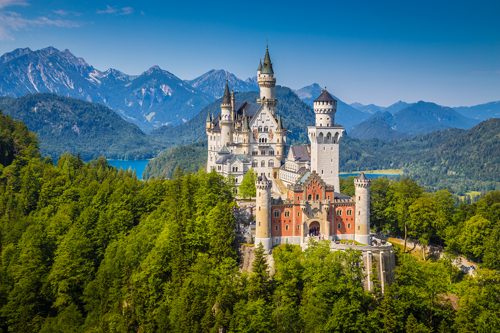

Germany is a glorious combination of breathtaking scenery in Bavaria, Saxony and the Black Forest and magical cities such as Munich, Leipzig and Lubeck. It’s also home to fairytale castles, islands such as Rugen Island in the Baltic Sea and of course the capital Berlin, one of the most magnificent cities in Europe.
In Germany the beer flows, as does the conversation with the more than ‘wilkomming’ hosts; the whole country is intertwined with music and culture, forests and fascinating architecture.
For brilliant disabled-friendly holidays in Germany, from cottages to hotels, get in touch with us today!
What's available with our disabled holidays in Germany?
- Accessible accommodation - guaranteed
- Flights
- Adapted transfers
- Mobility equipment hire - wheelchairs, hoists, shower chairs, electric beds, and more!
- Attractions and days out
- Financial protection
- Our award-winning service!
-

Accessible City Hotel
Hamburg- Bed and Breakfast, Room only
- City Breaks
- Hotels
- 3 Stars
The hotel is located in the heart of the city, in Hamburg's Gänsemarkt area. Within a few minutes of the hotel you will find the famous shopping streets, Alster and Jungfernstieg. Making this hotel the perfect place to stay in Hamburg.








-
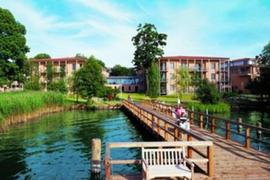
Wheelchair friendly hotel
Germany- Hotels
With its lakeside setting in the historic town of Rheinsberg, this hotel offers a fantastic array of barrier-free activities and superb accomodation that caters to the individuals needs.






-
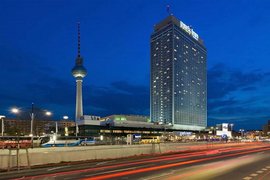
Accessible City Centre Hotel
Berlin- Full board, Half board, Bed and Breakfast, Room only
- City Breaks
- 1028 bedrooms
- Hotels
- 4 Stars
Situated directly on the legendary Alexanderplatz Square and close to the famous TV Tower, this accessible hotel is the tallest in Berlin and a landmark in its own right.





-

Accessible Hotel
Brandenburg > Frankfurt- Bed and Breakfast, Room only
- City Breaks
- 65 bedrooms
- Hotels
- 4 Stars
This disabled-friendly hotel enjoys a great location in the heart of Frankfurt with excellent public transport links for accessing the best bars and restaurants in the city centre.



-

Accessible Hotel
Brandenburg > Frankfurt- Bed and Breakfast, Room only
- City Breaks
- 256 bedrooms
- Hotels
- 4 Stars
Modern 4-star hotel offering comfortable accommodation in the heart of Frankfurt, close to the main shopping street Zeil.



-
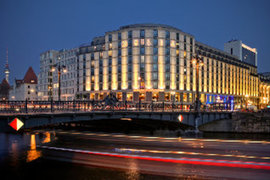
Superior 4-star Hotel
Berlin- Bed and Breakfast
- City Breaks
- Hotels
- 4 Stars
A modern superior hotel offering elegant accommodation on the prestigious Friedrichstrasse, overlooking the Spree river.






-

Accessible 4 star hotel
North Rhine-Westphalia > Cologne- Bed and Breakfast, Room only
- City Breaks
- 92 bedrooms
- Hotels
- 4 Stars
Four-star hotel ideally located in Cologne, offering excellent accommodation for business and private travellers.





-

City Centre Hotel
Brandenburg > Frankfurt- Bed and Breakfast, Room only
- City Breaks
- Hotels
- 4 Stars
This 4-star hotel is located in the heart of Frankfurt, walking distance to many of the city's attractions.




-

Accessible 4 star hotel
Bavaria/Bayern > Munich- Bed and Breakfast, Room only
- City Breaks
- 480 bedrooms
- Hotels
- 4 Stars
Elegant city hotel enjoying an idyllic setting beside the River Isar in the Haidhausen artists’ district of Munich.




-

Accessible 4 star hotel
North Rhine-Westphalia > Cologne- City Breaks
- Hotels
- 4 Stars
This stunning hotel is a listed building located in the centre of Cologne, right next to the Hahnentorburg and just a few minutes away from many historic attractions.


-
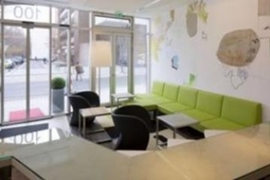
Accessible Three-Star Hotel
Berlin- Bed and Breakfast, Room only
- City Breaks, Pet Friendly
- 33 bedrooms
- Hotels
- 3 Stars
Located on the outskirts of Berlin’s famous Mitte district, this modern hotel is a great starting point from which to explore this incredible city.



-
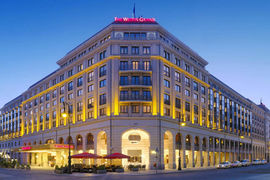
Luxury 5 star hotel
Berlin- City Breaks
- Hotels
- 5 Stars
Children's Activities, Fine Dining, Fitness Center / Gym, Swimming Pool - Indoor, ...

-

Accessible Hotel
Baden-Württemberg > Stuttgart- Room only
- Hotels
- 4 Stars
NH Stuttgart Airport is a stylish 4-star property offering comfortable accommodation near Stuttgart Airport. Highlights include a fitness centre and a complimentary airport shuttle service.

-

Accessible Hotel
Mecklenburg-Vorpommern > Wismar- Room only
- Hotels
- 4 Stars
Wyndham Garden Wismar is a modern 4-star property offering spacious accommodation just outside the Hanseatic city of Wismar. It boasts a relaxing wellness area with pool and is close to several Baltic Sea coastal resorts.

-

Accessible Hotel
Saxony > Leipzig- Room only
- Hotels
- 2 Stars
Property Location With a stay at ibis Leipzig Nord Ost in Taucha, you'll be in the suburbs and close to Paunsdorf Center and Abtnaundorfer Park. This hotel is within the vicinity of GolfPark Leipzig and Sachsen Park.





